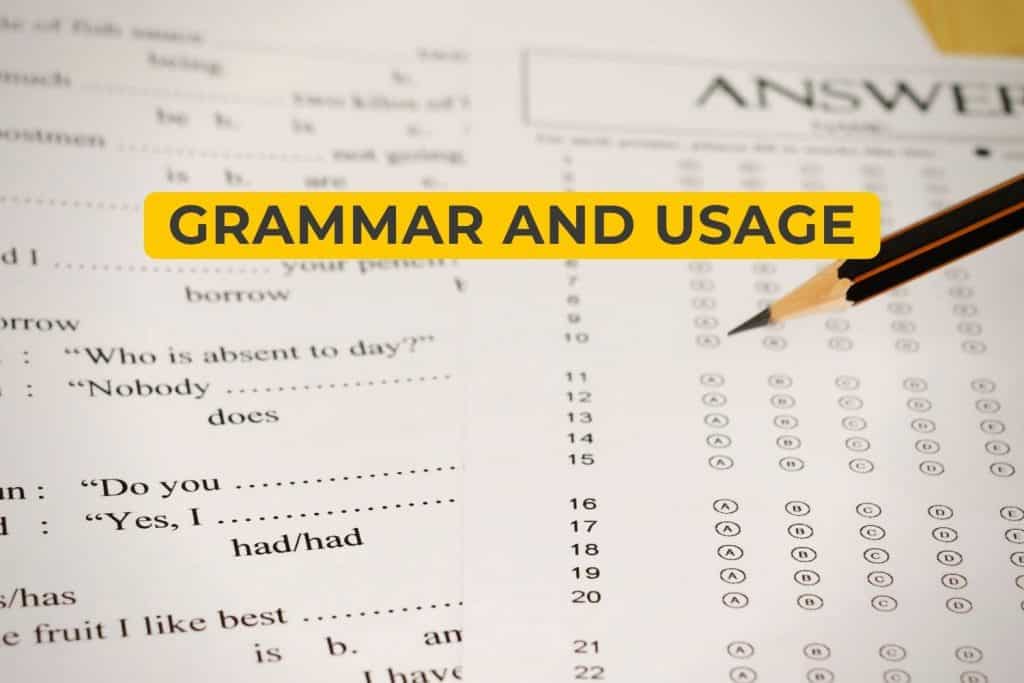When you have to form a study guide for ACT English, it’s easy to get overwhelmed. There’s a lot of content to cover, and not all of it is straightforward.
Breaking it up into smaller sections will help it become more manageable. Preparedness comes in many forms, and one of those is knowing what to expect. Understanding the format, knowing the content, and being prepared to work on your weak points will also help drive up your average.
A study guide for ACT English needs to cover these five areas:
- Know what to study
- Practicing test experiences
- Focusing on weak points
- Strategies for answering questions
- Good study habits
What You Need to Know

The ACT English section has two sections, Usage and Mechanics, and Rhetorical Skills. Each has three subsections broken into different lengths and percentages.
If you know what to expect on the test in terms of format and content, making a study guide for ACT English tests will be much easier and less stressful. Preparedness starts at understanding what you need to study, including what your strong and weak points are.
Usage and Mechanics
- Punctuation
- Grammar and usage
- Sentence structure
Rhetorical Skills
- Strategy
- Organization
- Style
Not Tested
- Spelling
- Vocabulary
The Usage and Mechanics sections focus on how to craft proper sentences to make grammatical sense.
Punctuation (10-15%)
- Comma use
- Period use
- Apostrophe use
- Colon use
Take the entire sentence into account to see where the punctuation makes sense.

Grammar and Usage (15-20%)
- Subject and verb agreement
- Pronoun and antecedent agreement
- Modifiers and modified word agreement
- Idiomatic usage
- Verb formation
- Pronoun case
- Formation of superlative and comparative adjectives and adverbs
Sentence Structure (20-25%)
- Placement of modifiers
- Shifts in construction
- Relationships between and among clauses
Rhetorical Skills often need more study, as these sections require critical thinking and decision making.
Strategy (15-20%)
- Relevant passages in context
- Developing topics by adding material that supports or not allowing material that takes away
Organization (10-15%)
- Organize ideas
Choose effective sentences:
- Opening sentences
- Transitional sentences
- Closing sentences
Style (15-20%)
- Select appropriate words for tone
- Select appropriate sentences for style
- Manage elements for sentence effectiveness
- Avoid ambiguity, redundancy, wordiness
Practice Tests

Often, practice test questions you find on the internet or in a library won’t give you the right idea of what to expect. The format, level of difficulty, and even the content itself might not be an accurate portrayal of a real ACT.
Therefore, when you’re looking for practice questions, be sure to search for copies of older ACT exams. These exams won’t be in commission anymore, so you won’t have to worry about getting an unauthorized look. What they will do is present the correct format and difficulty level you will see on the real test.
You can find older, official exam questions through your teachers, or ACT prep resources like websites or books.
Discover Your Weak Points
Knowing where your skills are weak can help you determine what to study and how much. Once you’ve obtained a few practice materials, you can easily figure out what kinds of questions stump you.
In doing a practice test, skip the ones you aren’t sure about. Go back to these later and take note of which ones you struggle with the most.
When you’re rounding up your problem questions, ranking them can give you a better idea of where your skill set is at. Some questions you’re unsure about might be easier than others. Some, you might think are impossible. Rank them from possible to impossible.
For “impossible” questions, ask yourself why they seem impossible. Are you completely lost in what they’re asking of you? If so, trace the question back to the category they refer to (sentence structure, organization, style, etc). Once you know the category your question comes from, you can search that topic in-depth, starting with the basics.
Reviewing the Basics

The basic ideas behind each category and subcategory are crucial because they always give you a starting point to go back to. The basics will give you a foundation upon which to build, so if you know these backwards and forwards, you can move on to more complex ideas.
Questions you Guess
If you have a list of questions where you don’t know the answer, but you think you could guess, practice more questions with similar formats or content.
If you’re frequently guessing, this could mean you know the basic theory, but after that, it gets a little fuzzy. You don’t have confidence in what you know. Review your notes like building blocks—first the basics, then everything that builds off of it.
If it’s the question wording that’s throwing you off, practice strategies for finding the correct answer. For a multiple-choice question, cross off the answers you know are wrong first. Then you’ll have a better chance of success focusing on what’s left.
If the answer involves trading possible words or phrases with others to make a different sentence, read the sentence aloud with the different words inside to see how it sounds. If it sounds weird, it’s probably not your answer.
Emphasis on Knowing Rules
However, avoid becoming dependent on your ear. Knowing grammatical rules will do much more for you, especially if no one you know regularly employs them. If you’re not used to hearing proper grammar or sentence structure, it won’t sound correct in a test format.
Test Strategies

Part of your study guide for ACT English should involve creating test strategies. When taking your practice tests, review them in the same way you would the real thing. That way, when you do sit down at the ACT, you don’t have to get overwhelmed because you’ve practiced your process.
One of the best ways to go through an exam like this is to give it a look over first. See how many questions there are and which ones are multiple-choice, short, long, or otherwise.
Even if you know the format ahead of time, it’s good to get a thorough look at what you’re about to do. Then there won’t be any surprises, you won’t miss any vital questions, and you can decide how to manage your time.
Once you’ve looked over the exam, decide where you want to start. For any question you don’t have an immediate answer to, skip it and come back later. That way, you can save time by getting the easy questions done first.
In tackling the harder questions, try not to dwell on them too long, or you’ll go overtime. Pick and choose the ones you think you’re capable of doing, and try to get the ones that are worth more.
Never leave a high score question blank. Even if you’re not sure about your answer, guessing will give you a chance. If you don’t even try, you definitely won’t get it right.
Studying Tips

Knowing what you have to study is all very well, but what about how you study? Set up some guidelines and boundaries for yourself and others to follow so you can put your best effort in.
Studying Space
If you try to learn in a noisy environment, it’s not going to work very well.
Try to find a nice quiet place to concentrate. Review your notes where nothing can distract you, reread from the textbook, take some time to do practice questions. If you have a specific studying spot, don’t use it for anything else.
For instance, if you study in your room, don’t try to play any video games there. The temptation to game instead of concentrating will become a problem, and you’ll spend most of your time struggling to ignore your console.
Studying Schedule
If you can, set up a designated time for your studying. Make a habit of spending half an hour or more looking over your material and focusing on your weaker knowledge points. Doing this at the same time every day will help your focus, so your brain knows it’s time for studying.
Telling your family about your study time and when you need them to be quiet will also help. You can work together to find a relaxing hour for you to get your work done.
Study with Classmates
Sometimes your peers can explain tricky concepts far better than your teacher can. Not only will you have support reviewing English together, but you can also help each other by comparing previous notes or test scores.
Conclusion

Setting up a time and place specifically for you to study will help get your brain in review mode. Using resources like your classmates can not only motivate you, it can also help you understand concepts you struggled with in class.
Knowing the format and content of your test is crucial, as is practicing on older official ACTs. You can get used to the style of questions and their difficulty level, so you won’t have any surprises on the day of the exam. Lastly, working through your more shaky understandings and making a test strategy can help you prepare for anything that comes your way.
Have any questions or other tips to share? Leave them in the comments.

